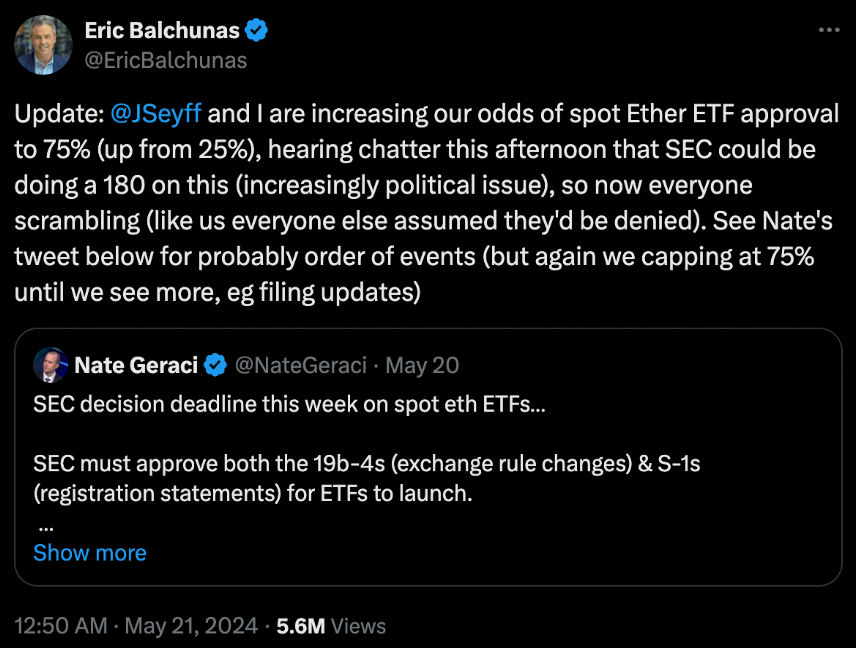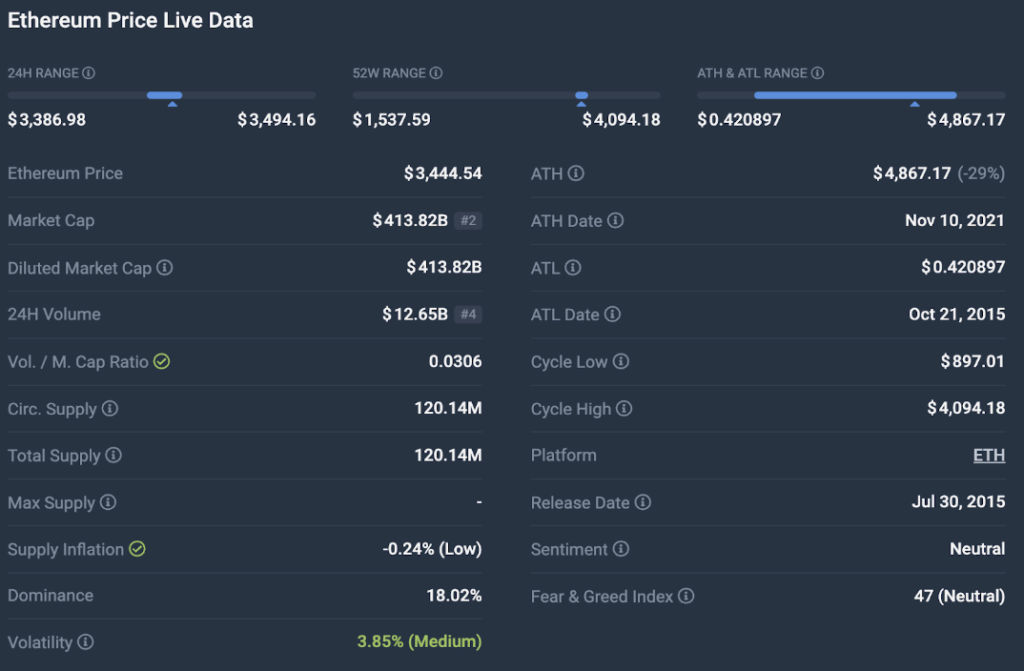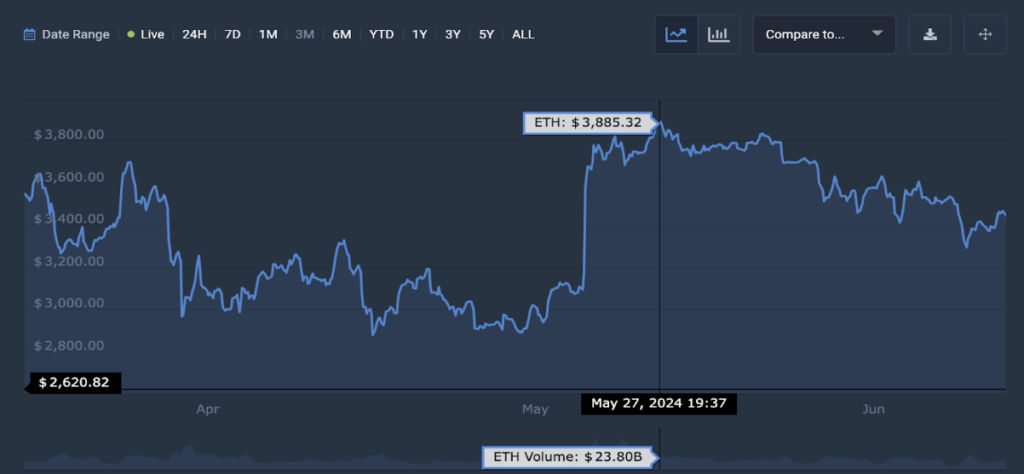This comprehensive overview may help in understanding where ETH ETFs currently stand.

Starting off with positivity, it looks like ETH ETFs may start trading by July 4th (Which is now delayed by the SEC).
We’re on the edge of a significant breakthrough: the approval of the first spot Ethereum ETFs by the U.S. SEC.
As speculation mounts, here’s a deep dive into the implications of this approval, exploring the background, recent developments, market implications, expert analysis, and more. This comprehensive overview may help in understanding where ETH ETFs currently stand.
What is Ethereum and what happened with Bitcoin ETF Approvals?
Ethereum is the second-largest cryptocurrency by market capitalisation, and has been a cornerstone of the blockchain ecosystem since its launch in 2015.
Unlike Bitcoin, which primarily serves as a digital currency, Ethereum supports smart contracts and decentralised applications (dApps), making it a versatile platform for innovation.
The journey of Bitcoin ETFs began with multiple rejections by the SEC, primarily due to concerns over market manipulation and insufficient regulatory oversight. However, in October 2021, ProShares’ Bitcoin Strategy ETF became the first Bitcoin futures ETF to gain approval, paving the way for further crypto investment products.
The first spot Bitcoin ETF was approved in January 2024 after a decade of regulatory hurdles which paved the way for the potential acceptance of Ethereum ETFs.
Recent Developments
One of the most compelling narratives of the Ethereum ETF is its impact on investors. The ETF structure provides several advantages, including ease of access, as investors can purchase Ethereum ETFs through traditional brokerage accounts. Additionally, ETFs offer enhanced protection, because regulatory oversight by the SEC ensures higher standards of security, keeping investor scepticism at bay.
Eight major asset managers, including BlackRock, VanEck, Franklin Templeton, and Grayscale Investments, have filed for spot Ether ETFs. The SEC has already approved the listing of these ETFs on major exchanges like Nasdaq, CBOE, and NYSE. The final approval of S-1 forms, which detail the fund’s structure, management, and investment strategy, is all that remains.On May 23rd, the SEC approved 19b-4 applications from these firms, allowing them to issue spot Ether ETFs.
“After careful review, the Commission finds that the Proposals are consistent with the Exchange Act and rules and regulations thereunder applicable to a national securities exchange.” SEC Chair Gensler.
Now 2 months later we are at the stage where S-1 filings may be approved by July 4th with Grayscale holding about 3 million ETH.
The Process Unveiled
- 19b-4s (Exchange Rule Changes) Imagine exchanges like the NYSE or Nasdaq wanting to list a brand-new product: Ethereum ETFs. To do this, they must file a 19b-4 form with the SEC. This filing asks for permission to change rules or introduce new products, essentially allowing the exchange to list these Ethereum-based ETFs.
- S-1s (Registration Statements) The S-1 is a deep dive into the ETF’s blueprint. It outlines everything from the fund’s management to how it plans to mirror Ethereum’s performance. This registration is critical as it provides potential investors with all the necessary information about the ETF.
- The SEC’s Decision-Making Process Both the 19b-4s and S-1s must be approved by the SEC for the ETFs to be legally sold. The SEC usually has 45 days to make a decision on the 19b-4 filings, extendable to 240 days. Approval of these filings means the ETFs can be listed, but without S-1 approval, they can’t be sold to investors.
- Potential for Delay Even with 19b-4 approval, the SEC can “slow play” the S-1 approval. This means they could take longer to review and approve the registration statements, allowing them more time to evaluate market conditions and the specific structures of these ETFs without outright denying the applications.
So what now?
The approval of Ethereum ETFs is expected to have significant market implications:
Price Movements: Previous data shows that the approval of Bitcoin ETFs led to a substantial increase in Bitcoin’s price. Similarly, Ethereum is expected to experience heightened price volatility. For instance, Ethereum rose 2% on the news and was trading at $3,900 as of press time.
Future Outlook: Bullish patterns, the potential approval of spot Ethereum ETFs, and historically favourable conditions during “Uptober” could drive Ethereum to new all-time highs by the end of 2024.
Market Predictions: Analysts are buzzing with excitement, predicting a potential 30% surge in Ethereum’s value within the first month of ETF trading. If Ethereum can smash through the psychological barrier of $4,000 and conquer the R2 Fibonacci pivot at $4,230, the sky’s the limit. With market sentiment on the upswing, we could see a swift rebound above $3,500, paving the way for Ethereum to reach new, unprecedented highs.
On 20 May 2024, Bloomberg ETF analysts Eric Balchunas and James Seyffart significantly increased their estimated odds of SEC approval for spot ETH ETFs from 25% to 75%. This change was brought on by emerging rumours suggesting that the SEC might be reconsidering its stance, driven by political considerations.

On the other hand a well-known crypto analyst, Pentoshi remains skeptical on the projected highs for the ETH after the ETFs roll out.Technical Analysis: Ethereum has broken out of a falling wedge pattern, with significant resistance expected between $4,000 and $4,230 and strong support near $3,000, aligned with the 200-day EMA.
Data and DashboardsMarket data from CoinMarketCap and Glassnode indicate a surge in trading volumes and active addresses, suggesting growing investor interest and market participation.

(Data as taken on 28th June )
Price movements of Ethereum show significant spikes around major news events.
Charts also show a substantial influx of institutional investments into Ethereum-related products, with a notable increase in Grayscale’s Ethereum Trust holdings.

Projects, Protocols and the People
Ethereum’s ecosystem hosts numerous key projects and protocols, including Uniswap, Aave, and Chainlink. These projects are poised to benefit from the increased attention and investment resulting from Ethereum ETF approvals.For instance, Uniswap’s daily trading volume saw a 15% increase following the news.
Users:
– Active Wallets: The number of active Ethereum wallets has surged to over 70 million, with daily transaction volumes exceeding 1.2 million.
– Transaction Volume: Ethereum’s transaction volume has consistently grown, reaching new highs of $15 billion daily, driven by DeFi and NFT activities.The crypto community is geared up for the Pros and Cons that come with ETF approvals. Community members on Crypto-twitter have been largely positive, reflecting excitement and bullish sentiment on this topic.

A Brief?
Approval of Ethereum ETFs could lead to increased mainstream adoption of Ethereum, providing a regulated and safer investment environment. Just like there are pros and Cons for everything, the SEC’s approval of Ethereum ETFs may represent a watershed moment for the cryptocurrency market.
With increased institutional participation, ETH ETFs will improve market liquidity and provide the means for a robust regulatory framework. Ethereum is set to achieve new milestones. Conversely, delays or denials could reflect the SEC’s ongoing concerns about the stability and security of cryptocurrency investments.
